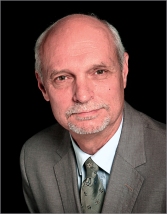PLENARY SPEAKERS
Our plenary speakers have published their abstracts and we bring them right to you!
Would you like to know more about Lynda, Gary, Hugh, David, Graham and Russell? Then the section Plenary speakers interviews is there for you just here :-).
GARY ANDERSON
CLIL Won’t Kill (I & II)—Au contraire!
Content and Language Integrated Learning (CLIL), teaching content subjects through other languages or vice versa, is an important emerging trend in current educational practices in many countries—and makes sense for a variety of reasons. This talk will look at those reasons, include an overview of the theoretical underpinnings of CLIL and then move into how the theory has been put into practice in various materials for young learners, tween-agers and teenagers. We’ll look at both ‘real CLIL’ and bilingual education (CLIL Won’t Kill I) and ‘CLIL lite’ or working subject matter into language classes (CLIL Won’t Kill II).
When: Saturday 09.00—10.00
HUGH DELLAR
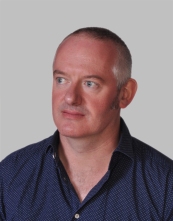 Localising the global coursebook
Localising the global coursebook
As ELT became a global industry, so too did coursebooks. In their attempts to be all things to all people – and to somehow be about everywhere – coursebooks often end up feeling as if theyare about nowhere in particular. When there is a recognizable identity, it is frequently very Anglo-centric. For teachers outside native-speakers contexts, with students who possess varying degrees of motivation, this can pose serious problems: how can teachersmake their students feel as if English relates to them, their lives and their own realities? In this talk, I explore these questions and suggest that the way teachers deal with everyday classroom materials can have a profound effect on students’ relationshipwith English.
When: Saturday 14.30—15.30
DAVID FISHER
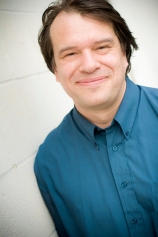 What is the Difference Between an English Teacher and a Maths Teacher?
What is the Difference Between an English Teacher and a Maths Teacher?
Do different school subjects need different approaches, or are all the teachers in a school engaged in the same process? David Fisher, director of The Bear Educational Theatre, will open this question and expand the discussion by demonstrating a number of less traditional activities that can be used in the language classroom.
When: Saturday 14.30—15.30
GRAHAM HALL
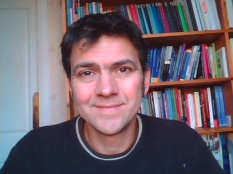 Tradition, innovation and change: teaching in theory … and in practice
Tradition, innovation and change: teaching in theory … and in practice
As English language teachers, we constantly encounter ideas and suggestions about how we might teach, and we are often encouraged to ‘engage with theory’ as part of our professional development.
Yet the relationship between theoretical ideas and what really happens in classrooms is not straightforward. Different approaches to language teaching and learning complement and contradict each other in complex ways. Furthermore, teachers’ own ‘personal theories’ also influence their teaching practices.
Thus, how might teachers make sense of language teaching and learning theories, and how might we relate these understandings to our own practice?
Drawing on a number of ‘practice and theory’ examples, I will suggest that rather than providing straightforward answers and solutions to classroom dilemmas, theory offers teachers an array of possibilities and perspectives which we may (or may not!) act upon in accordance with our own professional knowledge and experiences.
When? Friday 17.30—18.30
RUSSELL STANNARD
 Key tools that can impact on teaching and learning
Key tools that can impact on teaching and learning
In this talk Russell is going to look at some of the key technologies that really impact on our teaching and learning. These are simple technologies that teachers can use immediately and can help us with areas such as developing student’s fluency, feedback, reflection, delivering blended content etc. The talk is full of real examples of how technology can support our teaching and learning and even the most technophobic teacher will find it useful.
When: Saturday 09.00—10.00
LYNDA STEYNE, PH. D.
What Teachers Make
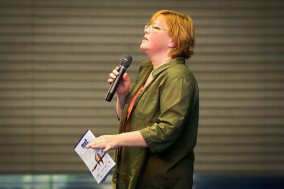 As teachers, we follow the required curriculum, prepare for our lessons, and hold forth on the grammatical structures of the English language in front of our students day-in and day-out. We create exercises, write tests, and calculate marks. Why? What exactly is the point of being an English teacher? Drawing on the research into the motivation of learning and teaching (Kubanyiova and Dörnyei; 2012, 2014) as well as from my experience interacting with both students and colleagues over the past quarter century, I’ll share what I’ve learned about the importance of our profession. After all, if we do not know why we teach English (or any language for that matter), how can we expect our students to value what we teach?
As teachers, we follow the required curriculum, prepare for our lessons, and hold forth on the grammatical structures of the English language in front of our students day-in and day-out. We create exercises, write tests, and calculate marks. Why? What exactly is the point of being an English teacher? Drawing on the research into the motivation of learning and teaching (Kubanyiova and Dörnyei; 2012, 2014) as well as from my experience interacting with both students and colleagues over the past quarter century, I’ll share what I’ve learned about the importance of our profession. After all, if we do not know why we teach English (or any language for that matter), how can we expect our students to value what we teach?
When: Sunday 09.00—10.00
